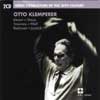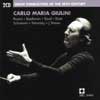Great Conductors of the 20th Century – Otto Klemperer
Two diametrically opposite podium masters in historic archive recordings
View record and artist detailsRecord and Artist Details
Composer or Director: Leoš Janáček, Igor Stravinsky, Richard Strauss, Ludwig van Beethoven, Wolfgang Amadeus Mozart, Kurt (Julian) Weill
Genre:
Orchestral
Label: Great Conductors of the 20th century
Magazine Review Date: 1/2003
Media Format: CD or Download
Media Runtime: 152
Mastering:
Mono
ADD
Catalogue Number: 575465-2

Tracks:
| Composition | Artist Credit |
|---|---|
| Symphony No. 38, "Prague" |
Wolfgang Amadeus Mozart, Composer
Berlin RIAS Symphony Orchestra Otto Klemperer, Conductor Wolfgang Amadeus Mozart, Composer |
| Till Eulenspiegels lustige Streiche |
Richard Strauss, Composer
Cologne Radio Symphony Orchestra Otto Klemperer, Conductor Richard Strauss, Composer |
| Pulcinella |
Igor Stravinsky, Composer
Bavarian Radio Symphony Orchestra Igor Stravinsky, Composer Otto Klemperer, Conductor |
| Symphony No. 25 |
Wolfgang Amadeus Mozart, Composer
Berlin RIAS Symphony Orchestra Otto Klemperer, Conductor Wolfgang Amadeus Mozart, Composer |
| Symphony No. 2 |
Ludwig van Beethoven, Composer
Berlin Radio Symphony Orchestra Ludwig van Beethoven, Composer Otto Klemperer, Conductor |
| Sinfonietta |
Leoš Janáček, Composer
Cologne Radio Symphony Orchestra Leoš Janáček, Composer Otto Klemperer, Conductor |
| Kleine Dreigroschenmusik |
Kurt (Julian) Weill, Composer
Berlin State Opera Orchestra Kurt (Julian) Weill, Composer Otto Klemperer, Conductor |
Composer or Director: Johann Strauss II, Ludwig van Beethoven, Maurice Ravel, Georges Bizet, Gioachino Rossini, Robert Schumann, Igor Stravinsky
Genre:
Orchestral
Label: Great Conductors of the 20th century
Magazine Review Date: 1/2003
Media Format: CD or Download
Media Runtime: 152
Mastering:
Stereo
Mono
ADD
Catalogue Number: 575462-2

Tracks:
| Composition | Artist Credit |
|---|---|
| Tancredi, Movement: Overture |
Gioachino Rossini, Composer
Carlo Maria Giulini, Conductor Gioachino Rossini, Composer Philharmonia Orchestra |
| Symphony No. 7 |
Ludwig van Beethoven, Composer
Carlo Maria Giulini, Conductor Chicago Symphony Orchestra Ludwig van Beethoven, Composer |
| Ma Mère l'oye, 'Mother Goose' |
Maurice Ravel, Composer
Bavarian Radio Symphony Orchestra Carlo Maria Giulini, Conductor Maurice Ravel, Composer |
| Jeux d'enfants (Petite Suite) |
Georges Bizet, Composer
Carlo Maria Giulini, Conductor Georges Bizet, Composer Philharmonia Orchestra |
| Egmont, Movement: Overture |
Ludwig van Beethoven, Composer
Carlo Maria Giulini, Conductor Ludwig van Beethoven, Composer Turin RAI Orchestra |
| Symphony No. 3, 'Rhenish' |
Robert Schumann, Composer
Carlo Maria Giulini, Conductor Philharmonia Orchestra Robert Schumann, Composer |
| (The) Firebird Suite |
Igor Stravinsky, Composer
Carlo Maria Giulini, Conductor Igor Stravinsky, Composer Philharmonia Orchestra |
| Kaiser, 'Emperor' |
Johann Strauss II, Composer
Carlo Maria Giulini, Conductor Johann Strauss II, Composer Vienna Symphony Orchestra |
Author: Richard Osborne
It was Klemperer himself who commissioned Weill to make this wind-band arrangement of numbers from The Threepenny Opera. He conducted it at the Kroll Opera in 1929 and two years later made the present stylish and pleasingly acerbic recording of excerpts from the suite with members of Berlin’s Staatskapelle.
Prior to the Weill commission, he had conducted the New York and Berlin premières of Janácek’s Sinfonietta, the latter in the presence of the composer. The 1956 performance gets off to an unpromising start – finding a platoon of competent trumpeters seems to have posed problems for the Cologne fixers – but what follows is an uncompromising, grainy, eloquent reading that repays study.
The rest of the collection focuses on performances Klemperer gave with German radio orchestras in the 1950s. They are of a piece in as much us they present us with the pre-grand-old-man Klemperer, the Klemperer of the immediate post-war years when the hallmarks of his conducting were clarity and drive.
Not everything works. Where Mozart’s Prague Symphony thrives on the approach, the youthful G minor Symphony K183 from the same Berlin radio sessions in December 1950 seems charmless and devoid of real interest. The 1957 Munich Pulcinella is let down by poor brass playing everywhere except in the ‘Vivo’ where Klemperer’s insistence on a truly monumental trombone sound makes the double-bass response seem rubbery and inadequate. The 1956 Cologne Till Eulenspiegel, by contrast, is superbly played, though Klemperer’s manic, raucous, occasionally rather cruel reading – his Till is a real hoodlum – will not be to all tastes.
His reading of Beethoven’s Second Symphony is familiar from EMI’s 1957 studio recording. This live performance is tauter with a more immediate recorded balance, though with no stereo dispensations. (The entire collection is in mono.)
Transcriptions of live Giulini performances exist going back to the early 1950s but the present compilation plays safe with a bias in favour of tried and tested studio recordings. That said, the collection makes for more consistently pleasing listening than the Klemperer. Writing in these columns in April 1958, Jeremy Noble admired Giulini’s performances of the Bizet and the Stravinsky: ‘It is a real joy to hear the Philharmonia played on, like a single magnificent instrument, by a conductor with a really keen ear for details of blend and balance and phrasing’. The Firebird still sounds superb, despite what seems to be a certain amount of technical jiggery-pokery at the start of Kashchei’s dance.
The Beethoven performances are purposeful and solid. In the Seventh Symphony, Giulini is as mindful of the great harmonic drama that is being played out as he is of the dance element, though the performance has plenty of drive, too. The Chicago sound is weighty and splendidly ‘centred’, that of the horns and basses especially so, and there is some fine solo wind playing. On the debit side, Giulini repeats the first movement exposition then skimps on repeats elsewhere. Nor are the violins antiphonally disposed, always a drawback in this symphony.
If the Seventh is an opportunity missed – Giulini’s forgotten 1969 Chicago Brahms Fourth, a recording much admired by Sir Simon Rattle, would have been a better choice – the revival of his 1958 Philharmonia account of Schumann’s Rhenish Symphony is a real thrill. It is a performance of verve and eloquence – somewhat after the manner of Furtwängler’s Schumann Fourth – and gloriously played. ‘Re-orchestrated by Mahler’ it says on the CD cover, which is a bit of an exaggeration. I add fresh thyme and a few other odds and ends suggested by Gordon Ramsay when cooking partridge in braised cabbage but that doesn’t make it a Ramsay recipe.
The compilation begins with a 1964 Philharmonia recording of Rossini’s Tancredi Overture, an overdriven, big-band affair with some occasionally coarse string playing. The Vienna Symphony Orchestra’s performance of the Emperor Waltz which ends the collection seems over-drilled in places but there are moments, in the coda particularly, where Giulini really does work his magic, the playing lofty and serene.
Discover the world's largest classical music catalogue with Presto Music.

Gramophone Digital Club
- Digital Edition
- Digital Archive
- Reviews Database
- Full website access
From £8.75 / month
Subscribe
Gramophone Full Club
- Print Edition
- Digital Edition
- Digital Archive
- Reviews Database
- Full website access
From £11.00 / month
Subscribe
If you are a library, university or other organisation that would be interested in an institutional subscription to Gramophone please click here for further information.




